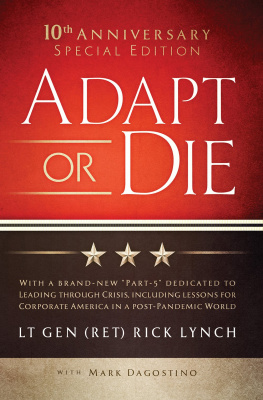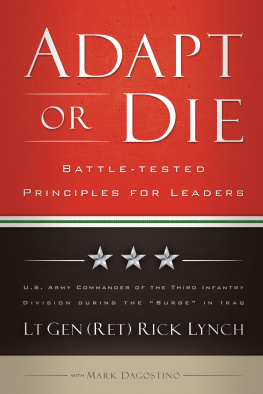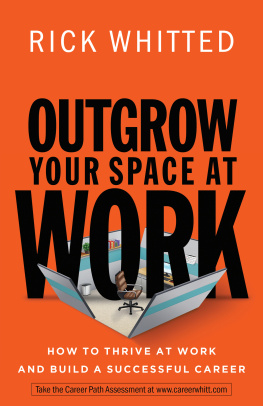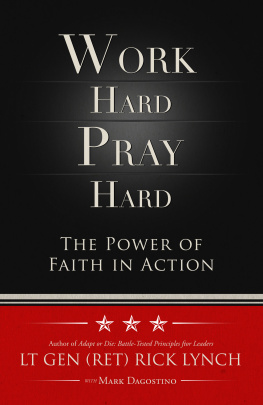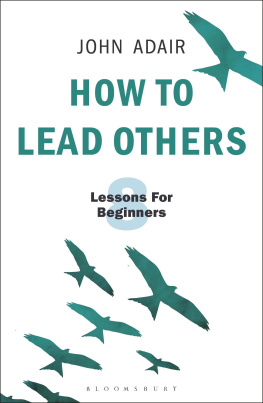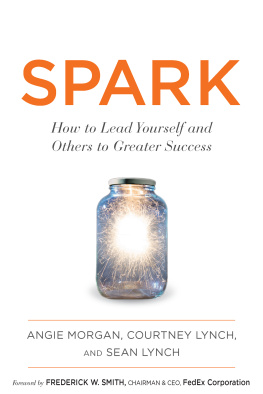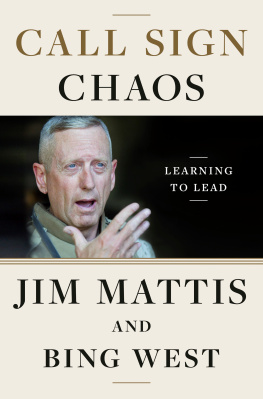Copyrighted Material
Adapt or Die
10th Anniversary Edition
With a brand-new Part 5 dedicated to Leading Through Crisis, including Lessons for Corporate America in a Post-Pandemic World
Copyright 2021 by Lt. Gen. (Ret.) Rick Lynch. All Rights Reserved.
All rights reserved. No part of this publication may be reproduced, stored in a retrieval system, or transmitted in any form or by any meansfor example, electronic, photocopy, recordingwithout the prior written permission of the publisher. The only exception is brief quotations in printed reviews.
For information about this title or to order other books and/or electronic media, contact the publisher:
LTG (R) Rick Lynch
www.rlynchenterprises.com
ISBNs:
978-1-7378833-2-6 (Hardcover)
978-1-7378833-0-2 (Softcover)
978-1-7378833-1-9 (eBook)
Cover and Interior design: 1106 Design
To Sarah,
for all of your love and support through the years.
AUTHORS NOTE
W hen I first sat down to write this book in 2012, I was right in the middle of one of the biggest transitions Id ever made in my life: leaving behind a successful thirty-five-year career in the Army and trying to start all over again in the civilian world. Talk about an adapt-or-die situation. There was a statistic floating around at that time that showed lifelong military folks who didnt find purposeful, meaningful work after retirement tended to wither away and die in as little as five years. Fiveyears!
Well, Im happy to tell you that Ive outlived that fate times two. Ten years have come and gone since my transition, and Im still here. Far from withering away and dying, my career is busier than ever, my family has grown by multiple grandchildren, and the work Im doingthe very life Im livingfeels more important and more meaningful to me than ever. Instead of retiring, I saw the opportunity I had in leaving the Army to use my military experience to make a difference in the world, specifically through my passion for developing leaders. And after all this time, Im able to speak from a new perspective: Im not the retired general anymore; Im a corporate executive and leadership trainer who just happens to be a retired general.
My goal back then was to build more concerned, caring, compassionate, and adaptive leadersthe kind of leaders who could stare down a crisis, change course as needed, and do the right thing not only for a companys bottom line but also for their people and their families, tooand thats what Ive done.
Its all been based on the principles found here in this book. Principles that are more relevant in corporate America today than ever before, which is why I felt it was so important to release an expanded, Tenth Anniversary Edition of Adapt or Die at this moment.
In the eighteen months prior to finishing this edition, our nation and the world endured a global pandemic that changed everything. It changed the way we work. The way we live. It changed our expectations, our sense of trust, and our sense of normalcy, whether we wanted it to or not. And honestly, if the concept of adaptive leadership didnt matter to you before, it sure as hell should matter to you now. Why? Because weve all had to learn to adapt. We didnt have a choice! And for the kinds of folks who might have been drawn to this book (or any leadership book) in the years preceding the pandemic, our particular sense of urgency and purpose ticked up as wellbecause if the pandemic proved anything, its the profound difference strong leadership makes during troubled times, whether its in the boardroom, in your living room, on Main Street, on Wall Street, or up in the highest offices in the land.
While the core principles and examples I shared in the original version of Adapt or Die remain intact here, what youll find toward the end of this book is a brand-new Part 5, dedicated specifically to the experience and examples of adaptive leadership in action that Ive lived and witnessed in corporate America in the last decade. The new chapters deal especially with adaptive leadership in times of crisis, spurred primarily by the questions corporate leaders and their workforces have been asking me throughout the pandemic and the early days of its aftermath. From questions about setting priorities, to time management, to conflict resolution, to embracing new technologies, and more, Ive done my best to answer as many as possible here.
And my answers come from experience.
One of my first roles after leaving the Army (and writing this book) was to become Executive Director of UTARIthe multimillion-dollar Research Institute at the University of Texas at Arlingtonwhere I spent four years developing robotics and other new technologies for the purpose of helping humanity. Which means technology doesnt scare me. So, adapting to virtual meetings and other pandemic-induced technological shifts came easy to meand Ill teach you how to make it a little easier for you.
I followed that experience by founding R Lynch Enterprises, my consulting firm thats actively providing keynote addresses, leadership training, and historical leadership retreats to nineteen companies (and counting) all across America, including nine pharmaceutical companies, various IT companies, construction companies, an award-winning hotel, and one of the nations largest retail grocery chains.
During it all, Ive also spent a significant portion of my time working with nonprofit organizations to ensure that our wounded warriors have the technology, housing, and support they need in the years that follow their great service to our country. Which means Im still in touch with the roots of my Army career, but filtering that experience through a different lens now, putting all of my skills to use to make life better for people I care about.
And taking care of people is my Priority One.
Leaving the Army wasnt an ending for me. It was just the beginning. I saw it as an opportunity, not an obstacle, and that is one of the key takeaways from this book. Thats the way it works with adaptive leaders, and why, for many, the shake-ups caused by the pandemic provided tremendous opportunity for positive change. If it didnt go that way for you, well, guess what? There will be other life-changing, world-shaking events in the future, too. Change happens. Its not a question of if, but when. And one of the most positive changes any leader can make is to never stop learning and to prepare for the unknown, so youll be unstoppable, no matter what the future may bring your way.
For that reason, even if youve already read the first edition of this book, I hope youll dig in herebecause the principles I talk about in these pages are worth reviewing more than once. I know this because the message of Adapt or Die has reached tens of thousands of people in the last decade, and the demand for these lessons has only grown stronger. Ive not only sold thousands of books via two editions (and a paperback version, too), but Ive been called to deliver an average of two speaking engagements per month since 2013. With even a lowball estimate of audience size of around 300 people per speech, thats 72,000 people in corporate America whove heard me talk about these principles in person, many of whom have followed up and asked me to return and advise their organizations again and again.
Why is this book still so relevant ten years later? Because these principles matterand they wont ever change.
Instead, as you take the time to review them and make them a part of your daily existence, what will change, what will become stronger, what will become better-prepared to adapt to any challenge in the futureis

